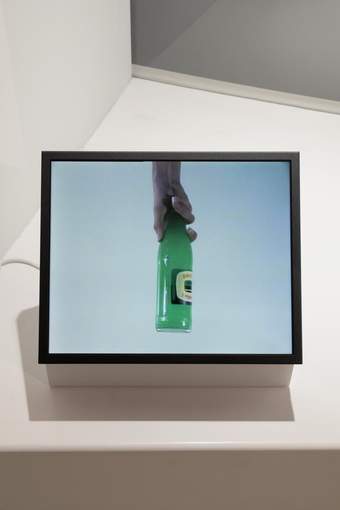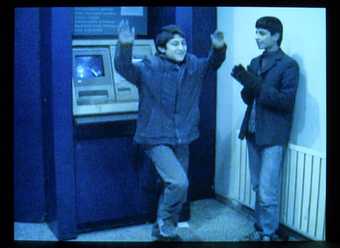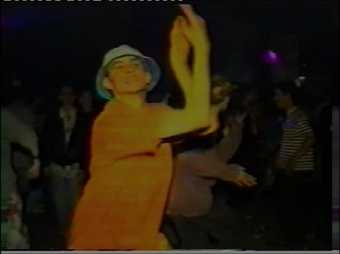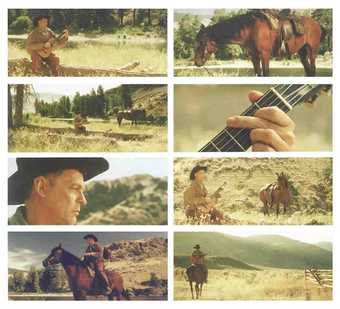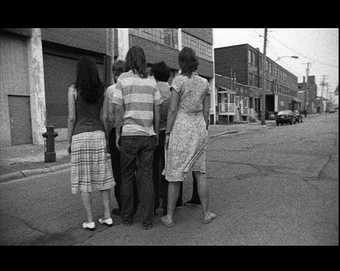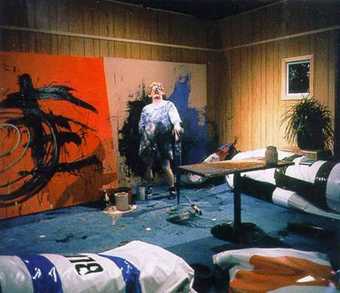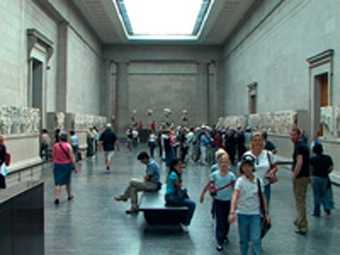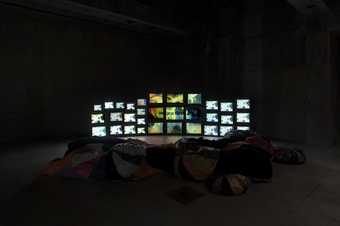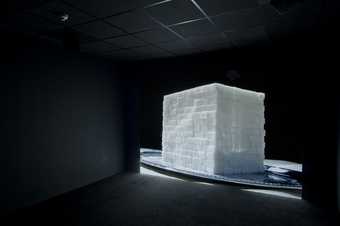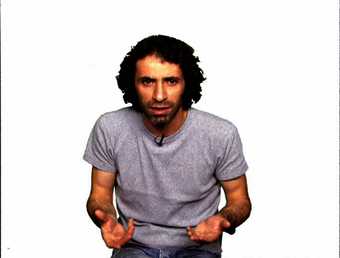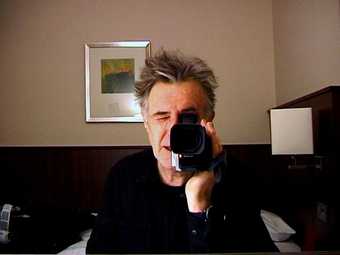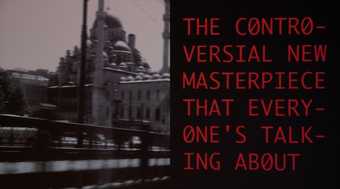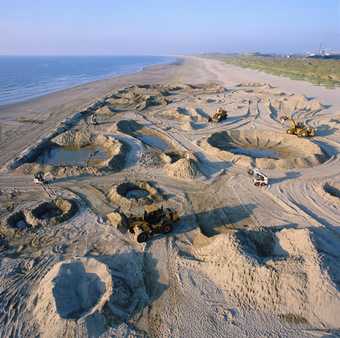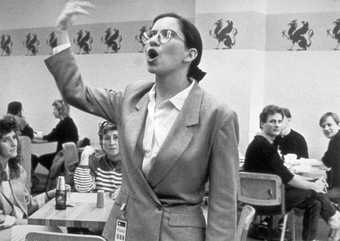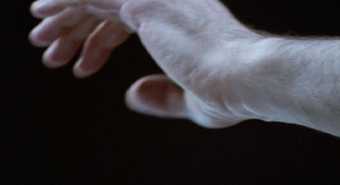In Tate Liverpool
Democracies
Free- Artist
- Artur Zmijewski born 1966
- Medium
- Video, 20 flat screens or 1 projection, colour and sound
- Dimensions
- Unconfirmed: 2hours, 26min
- Collection
- Tate
- Acquisition
- Purchased using funds provided by the 2009 Outset / Frieze Art Fair Fund to benefit the Tate Collection 2010
- Reference
- T13174
Summary
Democracies 2009 is a multi-part work consisting of twenty short documentary videos exploring moments of collective fervour in public spaces. It can be shown either on a sequence of monitors or as a large projection, and is number one in an edition of three. The subjects of the videos range from political demonstrations and military parades to memorial services and football matches. The range of events is deliberately broad, featuring the Loyalists’ Parade on the anniversary of the Battle of the Boyne in Belfast, protests in the West Bank against the Israeli occupation, and the funeral of the far right Austrian politician Jörg Haider in Vienna. Each segment is presented without commentary, leaving the viewer to form his or her own impression of the unfolding events.
Zmijewski chose his subjects gradually, relying on newspaper coverage, political posters or word of mouth to determine which events to record. On each occasion he and the five other cameramen who worked on the project blended into the crowd as much as possible, sharing their experience with the masses around them. Zmijewski strove to highlight the motives that bring people out in force for particular causes, principally the shared dynamics of ‘political drive and radical democracy [and] participation in conflict’ (Zmijewski in Maren Lübbke-Tidow 2009, p.24). The films highlight the similarities of group behaviour regardless of the political sympathies of the participants. Zmijewski has said:
I was less interested in the rightness or justice of the cause but more in this inner drive that moves people to debate, to publicly show their own needs, demands, requests, opinions – and to defend them with their own presence.
(Zmijewski in Maren Lübbke-Tidow 2009, pp.28–9.)
Although in this quotation the artist stresses the structure and underlying dynamic rather than the content of the gatherings, it is noteworthy that many of the episodes are right-wing and nationalistic in tone. Zmijewski has reflected on this aspect of the work and the implications of a cultural shift towards political conservatism in the west:
Shortly after all of these journeys I was thinking that Europe has made a turn to the extreme right – all of these symbols, slogans, the militancy, the reactionary, and obscurantism appear in excess. This overshadows the existence of demonstrations which demand social rights and social equality, which are anti-war protests, et cetera. It was interesting to see how this is translated into political spectacle – how these murderous feelings are transferred to a symbolical level and safely performed there.
(Zmijewski in Maren Lübbke-Tidow 2009, p.25.)
Zmijewski’s critical stance is reflected in the work’s title, which is intended as an ironic provocation:
I chose the title ‘Democracies’ because it’s a lie: They are not all democracies. Are the Autonomous Palestinian Territories a democratic country? I do not think so – they are occupied and fully dependent on Israel (are under its military control, in fact) and on the international community. Is Israel democratic? Maybe, but only if we add the term ‘colonial’ – it’s a ‘colonial democracy’, or maybe a ‘military democracy’. Northern Ireland is still under British occupation. Of course it is a democracy, but an occupied territory. Maybe Poland is a democratic country? Sure it is, but in this democracy women do not share equal rights with men. One of the basic democratic rules is to observe the equality of citizens. That’s why I described these movies as ‘Democracies’ – because of the lack of democracy in these countries.
(Zmijewski in Maren Lübbke-Tidow 2009, pp.23–4.)
Most of the episodes in Democracies depict contemporary events as they unfold; however two of the twenty films feature re-enactments of battles of the 1944 Warsaw Uprising staged by local history enthusiasts. These segments typify the nationalistic tenor of much of the work. They also resonate with Jeremy Deller’s The Battle of Orgreave Archive (An Injury to One is an Injury to All) 2004 (Tate T12185), the central component of which is a feature-length film documenting a re-enactment of the 1984 clash between protesting miners and police.
The presentation of relatively ‘straight’ documentary footage in Democracies contrasts with more structured scenarios typical of Zmijewski’s earlier practice. In many of his earlier works the artist manufactured situations in which people were asked to participate, often unwittingly exposing their own prejudices and the structures of control that underlie human relations. In his 2005 work Repetition he restaged Philip Zimbardo’s infamous 1971 Stanford prison experiment, casting members of the public as prisoners and guards then filming the results as the social experiment descended into sadism and chaos. Although Democracies adopts a different approach, Zmijewski’s enduring interest in structures of power remains evident in the work’s depiction of group psychology in action.
Further reading
Artur Zmijewski: If it happened only once it’s as if it never happened, exhibition catalogue, Zacheta National Gallery of Art, Warsaw, and Kusthalle Basel, Basel 2005.
Gerald Matt, ‘Artur Zmijewski: Philosophy in Action’, Interviews 2, Vienna 2008, pp.340–8.
Maren Lübbke-Tidow, ‘Artur Zmijewski: A Conversation on “Democracies”’, Camera Austria, no.107, 2009, pp.23–35.
Rachel Taylor
November 2009
Does this text contain inaccurate information or language that you feel we should improve or change? We would like to hear from you.
Display caption
Aiming to blend into the crowd as much as possible, Zmijewski and his cameramen filmed a series of politically charged gatherings, including demonstrations, military parades and memorial services. Many of the events are extreme right-wing and nationalistic, reflecting what the artist sees as a general cultural shift in Europe. ‘I was less interested in the rightness or justice of the cause’, Zmijewski has said, ‘but more in this inner drive that moves people to debate, to publicly show their own needs, demands, requests, opinions – and to defend them with their own presence’.
Gallery label, November 2015
Does this text contain inaccurate information or language that you feel we should improve or change? We would like to hear from you.
Explore
- architecture(30,960)
-
- public and municipal(2,385)
-
- post office(15)
- townscapes / man-made features(21,603)
-
- street(1,623)
- formal qualities(12,454)
-
- photographic(4,673)
- music and entertainment(2,331)
-
- music(916)
- clothing and personal items(5,879)
-
- uniform / kit(324)
- instrument, drum(177)
- boy(1,153)
- group(4,227)
- government and politics(3,355)
-
- political belief(71)
- political rally(6)
- car(502)
You might like
-
Roderick Buchanan Sodastream
1997 -
Fikret Atay Rebels of the Dance
2002 -
Mark Leckey Fiorucci Made Me Hardcore
1999 -
Rodney Graham How I Became a Ramblin’ Man
1999 -
Ulla von Brandenburg Around
2005 -
Paul McCarthy Painter
1995 -
Simon Martin Wednesday Afternoon
2005 -
Monster Chetwynd Hermitos Children, the pilot episode
2008 -
Kader Attia Oil and Sugar #2
2007 -
Rabih Mroué On Three Posters
2004 -
John Smith Hotel Diaries
2001–7 -
Young-Hae Chang Heavy Industries (Young-Hae Chang, Marc Voge) TEASER
2010 -
Aleksandra Mir First Woman on the Moon
1999 -
Andrea Fraser Museum Highlights: A Gallery Talk
1989 -
Douglas Gordon Feature Film
1999


